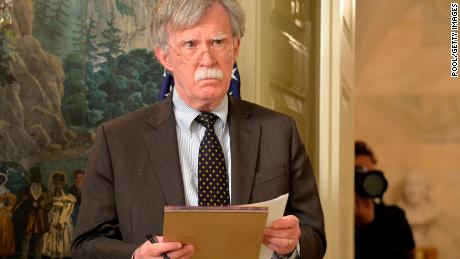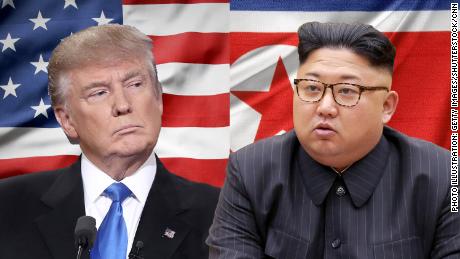North Korea threatens to cancel Trump summit over US nuke demands
(CNN)North Korea has threatened to abandon planned talks between leader Kim Jong Un and US President Donald Trump in June if Washington insists on pushing it "into a corner" on nuclear disarmament.
A statement published by the state-run Korea Central News Agency (KCNA) said North Korea would never accept economic assistance from the US in exchange for unilaterally abandoning its nuclear program.
Kim Kye Gwan, North Korea's First Vice Minister of the Ministry of Foreign Affairs, was quoted in the article as saying the US said "it would offer economic compensation and benefit in case we abandon (nuclear weapons)."
"We have never had any expectation of US support in carrying out our economic construction and will not... make such a deal in future," he added.
If the Trump administration was "genuinely committed" to improving ties with Pyongyang, "they will receive a deserving response," Kim Kye Gwan said. "But if they try to push us into a corner and force only unilateral nuclear abandonment, we will no longer be interested in that kind of talks and will have to reconsider ... the upcoming summit."
Pyongyang's rhetoric is similar to Trump's own: he said in April that even once parties are at the negotiating table, if talks aren't going the right way, "I will respectfully leave the meeting."
South Korean Foreign Minister Kang Kyung-hwa spoke with US Secretary of State Mike Pompeo early Wednesday morning Seoul time, according to a statement, which quoted Pompeo as saying preparations would continue for the Trump-Kim summit, "keeping in mind this action of the North."
"Minister Kang and Secretary Pompeo agreed to continue close cooperation between South Korea and the United States to achieve a complete denuclearization and peace settlement on the Korean Peninsula," the South Korean statement said.
Adam Mount, a Korea expert at the Federation of American Scientists, said Pyongyang was seeking "to revise the terms of negotiations, not to end them altogether."
"The United States is faced with a critical choice: will it pursue a deal with North Korea that improves US and allied security but falls short of immediate denuclearization? Or will it walk away with nothing?" he added.

Play Video
Bolton: Strong prospects for North Korea if ... 01:00
Not following the Libya model
The statement referenced comments made by Trump's national security adviser John Bolton about Libya being a potential model for North Korean denuclearization.
In December 2003, after months of negotiations with the US, Libyan leader Moammar Gadhafi agreed to dismantle his nuclear, chemical and biological weapons programs. Eight years later, after Washington soured on Gadhafi, NATO forces helped overthrow him, and he was later cornered by rebels who beat and abused him before summarily shooting him in the head.
Pyongyang has referenced multiple times in the past its perceived need for a strong nuclear deterrent is based on US military aggression in the Middle East and elsewhere.
Bolton's comments, Kim said, were indicative of "an awfully sinister move to impose on our dignified state the destiny of Libya or Iraq which had been collapsed due to yielding the whole of their countries to big powers."
"It is absolutely absurd to dare compare (North Korea), a nuclear weapon state, to Libya which had been at the initial stage of nuclear development," he added. "(The) world knows too well that our country is neither Libya nor Iraq which have met miserable fate."
Singling out the national security adviser for personal criticism, Kim said that North Korea had "shed light on the quality of (John) Bolton already in the past, and we do not hide our feeling of repugnance towards him."
Some analysts suggested that by focusing its statement so much on Bolton, rather than Trump, North Korea could be hoping to pressure the US President into sidelining his national security adviser.
Trump has talked up his achievements with North Korea, even encouraging crowds to chant "Nobel! Nobel!" at rallies.
Inter-Korean talks suspended
After weeks of improving ties on the Korean Peninsula, capped by the dramatic image of Kim shaking hands with South Korean President Moon Jae-in, things took a sudden step backwards Wednesday.
In a missive delivered to the South in the early hours of the morning, the North said it was suspending high-level talks scheduled for Wednesday in view of "provocative military disturbances with South Korea."
North Korea's anger, which took both Seoul and Washington off guard, came as the two allies were conducting annual "Max Thunder" air force drills, which Pyongyang has always objected to in the past and accused of destabilizing the situation on the Peninsula.
In a statement, South Korea's Unification Ministry said it was regrettable that the North unilaterally postponed the talks due to the annual (South Korea-US) joint air combat drills."
An earlier KCNA report said the Max Thunder 2018 air combat drill was against the declaration -- signed last month between the Koreas -- wherein they agreed to cease all hostile acts against each other.
Back in March, when South Korea's national security adviser told reporters at the White House that Kim had invited Trump to meet, he also said that Kim "understands that the routine joint military exercises between the Republic of Korea and the United States must continue."
'Not a cakewalk'
While Wednesday's statements were a noted departure from the conciliatory language North Korea had been using recently, analysts said Pyongyang is unlikely to abandon the Trump-Kim summit, when it has been trying to get a seat at the table with Washington for so long.
Experts said Pyongyang was likely annoyed by statements from both Washington and Seoul which painted North Korea as the weaker partner in negotiations, responding to US pressure rather than being treated as an equal nuclear power.
"Kim wants a summit, but I think the North Koreans are bent out of shape by Trump Administration officials claiming pressure brought them to the table," said Jeffrey Lewis, a non proliferation expert at the US-based Middlebury Institute of International Studies.
Christine Ahn, co-founder of Women Cross DMZ, which promotes peace building initiatives, pointed out North Korea has "made significant concessions" in the run up to the Trump-Kim summit.
"They suspended their ICBM and nuclear testing, they closed the nuclear testing site, and they just released three detained Americans," she said. "I wouldn't say that the Singapore meeting is off the table, but perhaps time for the US to change its tone."
CNN Beijing bureau chief Tim Schwarz, who has visited North Korea multiple times, said the "suggestion from the Trump administration that North Korea can be bought is also something that infuriates Pyongyang."
"North Korea would never admit that economic pressure has forced it to consider giving up its nukes. Its whole self identity is built on self-reliance," he added.
"North Korea has been extremely restrained in its public announcements since agreeing to the South Korea and the US summits. Now it appears to be annoyed that it is being seen as soft ahead of the main event in Singapore in June and this could be seen as reminding people that it is no walkover."
Other analysts agreed. Oliver Hotham, managing editor of Korea Risk, said there was "bound to be some push-back from the North Koreans eventually."
"The Trump admin has been acting like denuclearisation is a done deal, talking about economic incentives and shipping North Korean nuke hardware out of the country," he said. "Now the North Koreans are making it clear this is not going to be a cakewalk and they can play tough too."
James Griffiths reported and wrote from Hong Kong. Sophie Jeong reported from Seoul, South Korea. CNN's Zachary Cohen, Yoonjung Seo, Kevin Liptak, Ryan Brown, Barbara Starr, Laura Koran and Jeff Zeleny contributed reporting.
News Courtesy: www.cnn.com











